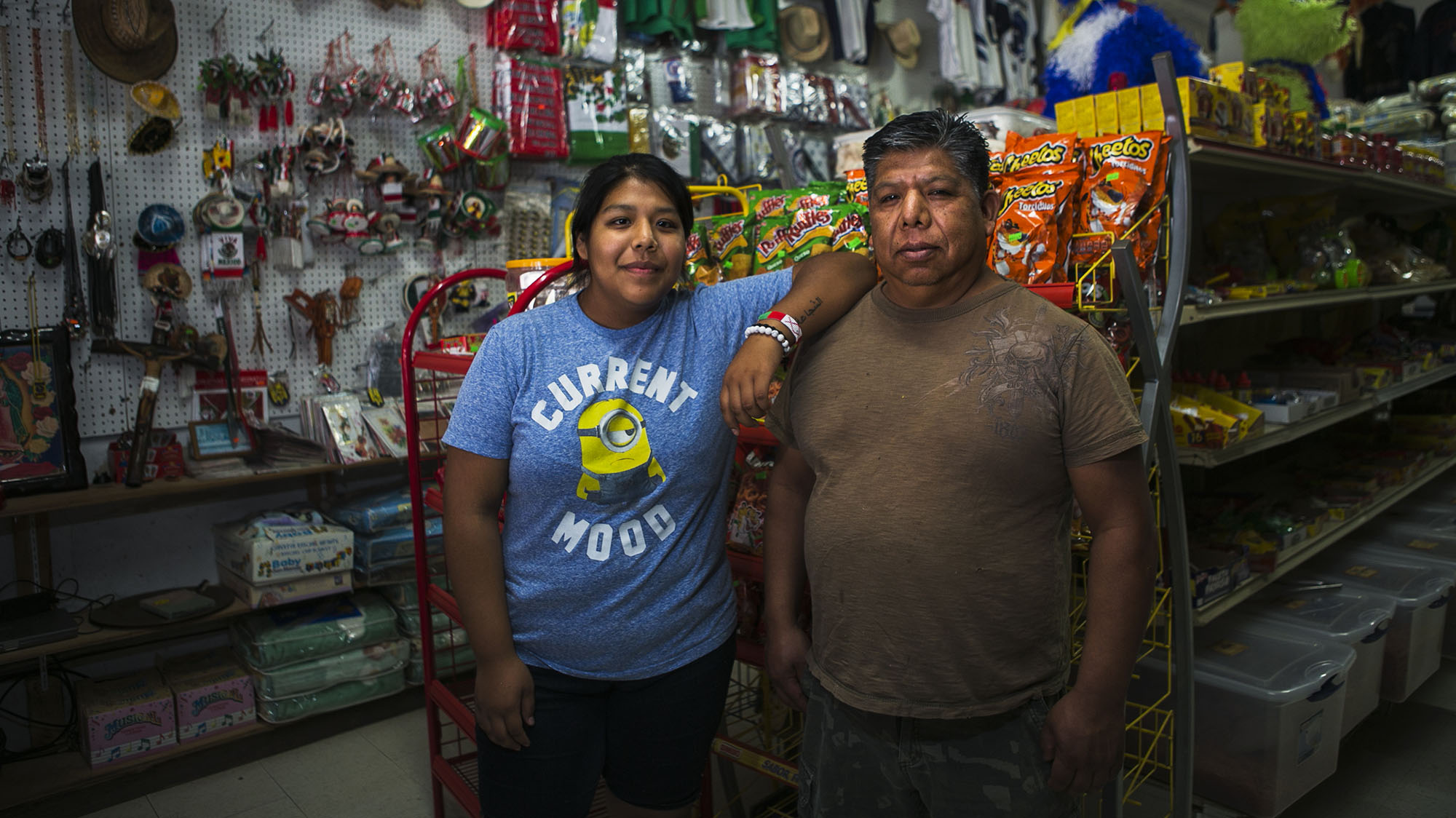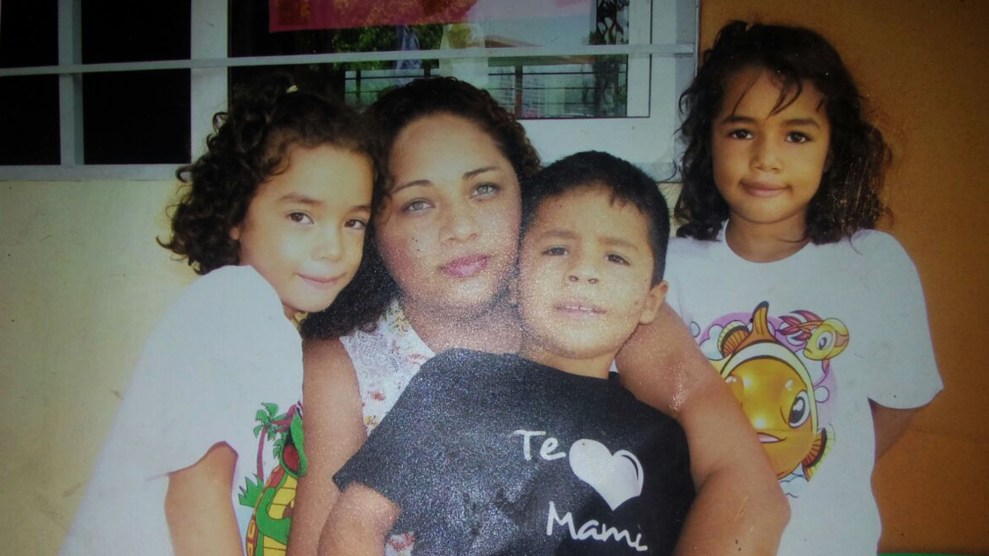Over the weekend, Charlottesville, Virginia, exploded in violence over the impending removal of a Confederate monument. White nationalists, Ku Klux Klan members, and neo-Nazis clashed with counter-protesters, and the fighting reached a horrifying crescendo when a white nationalist drove his car into the crowd, injuring 19 people and killing one.
It’s no small wonder that tensions have escalated to a dangerous point. After Dylann Roof brought a gun into an African American church in Charleston and killed nine parishioners, a familiar debate in the South around Confederate symbolism resurfaced, and it was clear the ghosts that haunt the South from even before the Civil War were far from exorcised. As a presidential candidate, Donald Trump saw opportunity in a disillusioned white working class and a tension that had been simmering below the surface for decades, and he took full advantage.
KKK chapters across the Southeast have struggled in recent decades to do much more than merely survive, but their numbers have grown over the past several years, and KKK leaders credit their resurgence to Trump and his white nationalist supporters. In Tennessee, my home state, a Memphis corrections officer resigned in November after expressing support for the KKK on his Facebook page and posting that he hoped the Obama family was hanged. A white supremacist conference has been held annually near Nashville for the past six years. And according to the Southern Poverty Law Center, Tennessee is home to 38 active hate groups—more than almost any other state in the Southeast. (Florida has 63, and Virginia has 39).
Since Trump’s election, there has been ample coverage of white people—the rise of white nationalism, the white working class that makes up Trump’s core constituency, the 53 percent of white women who voted him into office. Much less has been written about the people of color who live and work amid the rising tide of white nationalism in rural red states.
I grew up in a town called Bells, one of the five small towns that make up Crockett County in West Tennessee. The county is 83 percent white—I am also white—14 percent black and 10 percent Hispanic. (For comparison, according to 2016 Census data, Tennessee’s population is only 17 percent black and 5 percent Hispanic.) The median household income is $35,000, and 19 percent of the county’s 14,411 residents live below the poverty line. Most of the people I went to school with are still there. The area is deeply rural—the main highway that winds through the county is framed by cotton fields and pastures where cows keep a lazy watch over passing cars. Friday night football reigns supreme; game attendance is only second in importance to church. Many families have been here for generations, passing down their farmland and businesses to their children and grandchildren.
It can be a lovely place to live, but in counties like Crockett, it’s hard to be anything other than white. So I decided to go back home and talk to the people I should have been talking to all along—people of color who live and work and go to school with white Trump supporters. They told me how it feels to live among neighbors who voted against their best interests and—worst case—their basic existence.
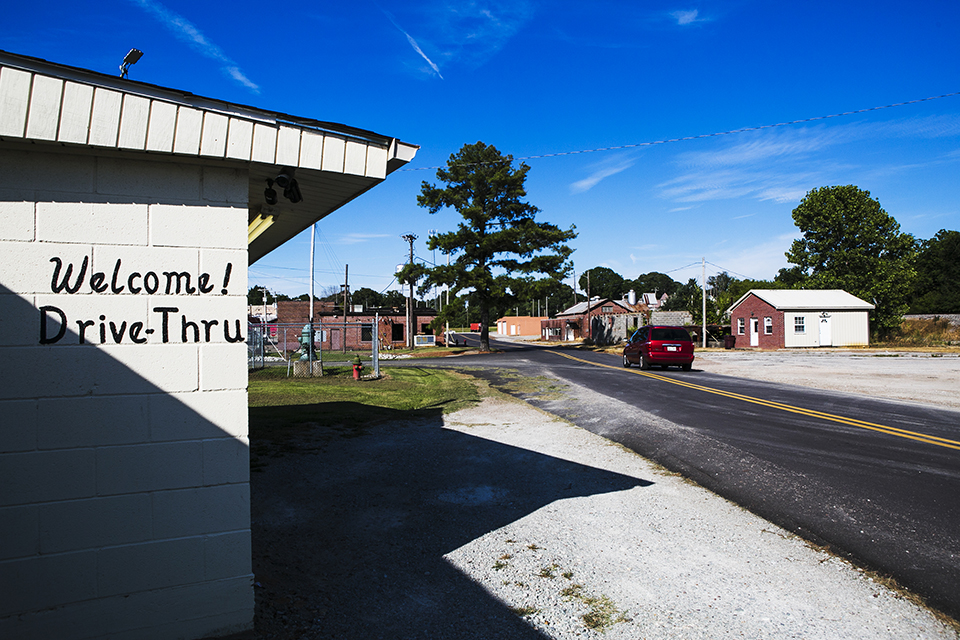
Highway 79, which runs through the heart of Bells.
Yalonda M. James
Madyson Turner: “With the way it’s going now, I’m actually scared that I won’t make it.”
I remember high-school Madyson Turner as a vibrant young black woman with a sense of humor that could dissipate tension in any room. (Turner’s name has been changed here to protect her privacy.) But when we meet up in a Subway sandwich shop in Alamo, there’s a new weight to her shoulders, and her infectious laugh doesn’t come quite so easily.
When she first began to see reports about the violence in Charlottesville, Turner thought it was a tasteless joke. Then she saw videos of the clash on Saturday, and her phone rang—her boyfriend was calling to check on her and process what was happening. He sounded upset. What he said tore at her: “I would rather the world end instead of us having to keep dealing with this stuff.” What hurt her more was the realization that she agreed with him.
“With the way it’s going now, I’m actually scared that I won’t make it,” she said to me in a text message.
Turner tells me that over the past year, life for her family has changed. She hints that her parents have been in West Tennessee long enough to know which families fought against civil rights “back in the day.” Since Trump’s election, they’ve warned her to steer clear of a list of people that is too long for comfort.
The day after the November presidential election, Turner went with her mother to the store, and they both kept their heads down. “We just feel like we don’t belong here anymore,” she says.
Turner’s mom, who cleans houses in town for a living, went to work a couple of days after that, and her employer, an older white woman, brought up the results of the recent election. The two had talked politics before—Turner’s mom is a Democrat, and her employer is a Republican. “Well, you might as well come and live with me now,” the employer said. “You gonna be mine eventually.”
She called her daughter in tears. Turner immediately got in her car and picked her mother up to bring her home.
Last year before the election, a young woman Turner described as one of her best friends casually mentioned she hoped for a Trump victory so that he might “do away with some of these African American people.” She quickly clarified that she wasn’t referring to Turner’s “type,” but when Turner sharply asked her what she meant, she couldn’t answer. Another friend assured her that it would be okay if Trump won the election because she would convince her parents to purchase Turner’s family as their new slaves. In a place where a few large plantation-style houses remain scattered through the county, the “joke” feels a lot like a threat.
“I saw a lot of true colors from a lot of people since the election—down with African Americans, down with Hispanics, build the wall, even for the legal ones,” she says. “It really hurts.”
She works as a dispatcher for Kirkland’s, a home goods store, where she handles shipping coordination, but she’s hoping to move into a role that is more IT-focused. Even one of her coworkers—a manager—insisted on seeing a copy of her business degree for days, to the point that Turner finally gave in and brought it to her to examine. It’s hard to not hear echoes of birtherism claims that plagued Barack Obama throughout his presidency in actions like those.
“It gets me emotional sometimes,” she tells me. “I wake up, and I never know, am I gonna get called the ‘n word’ today? Am I gonna have to defend my education?”
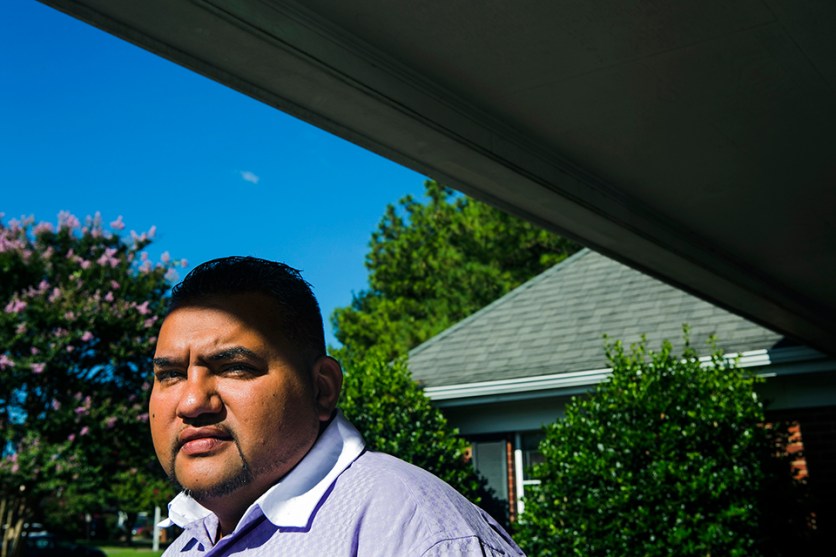
Pastor Alex Romero.
Yalonda M. James
Alex Romero: “There are always going to be ways.”
Off a country highway, hidden a bit behind a curve in the road populated by thick trees, sits a tiny church. The clapboard building reaches skyward with a steeple that feels as if it came up a bit short, and the parking lot is simple gravel.
On the Wednesday night I visit, the church booms with music. A live band shakes the unsteady walls of the pastor’s office. Alex Romero shepherds the congregation, which includes a lot of undocumented immigrants, several of whom have had family members deported. Many have become reluctant to leave their homes, for fear of an ICE raid. “There’s been a lot of media about, ‘Don’t go to the Walmart in Jackson, because immigration is there,'” Romero says. They can’t distinguish between real threat and hearsay, and it’s always better to be safe than to be sorry and risk losing your family.
Romero heard reports of ICE agents arresting eight people the week before we spoke; he’s also heard of Hispanic people in the area getting stopped simply for looking Hispanic. Mother Jones was unable to confirm those arrests, and the Memphis Commercial Appeal reported that a federal Office of Personnel Management website said there were only 23 ICE staffers in Tennessee as of last year, although an ICE official told the newspaper the real number is actually higher. Rumor blurs with reality, and anxiety has been steadily rising for this community over the past year.
“We’re just waiting to see what happens, the loss that’s gonna come,” the 39-year-old says. “We know it’s coming.” His fear isn’t entirely unfounded—ICE arrests have risen nationally. Between February and May, an average of 108 undocumented immigrants with no prior criminal record were arrested each day. For reference, that’s a 150 percent increase from the same time span last year. In the latest sweep, according to an ICE release, 650 people were arrested, and half of that group were collateral arrests with no criminal record.
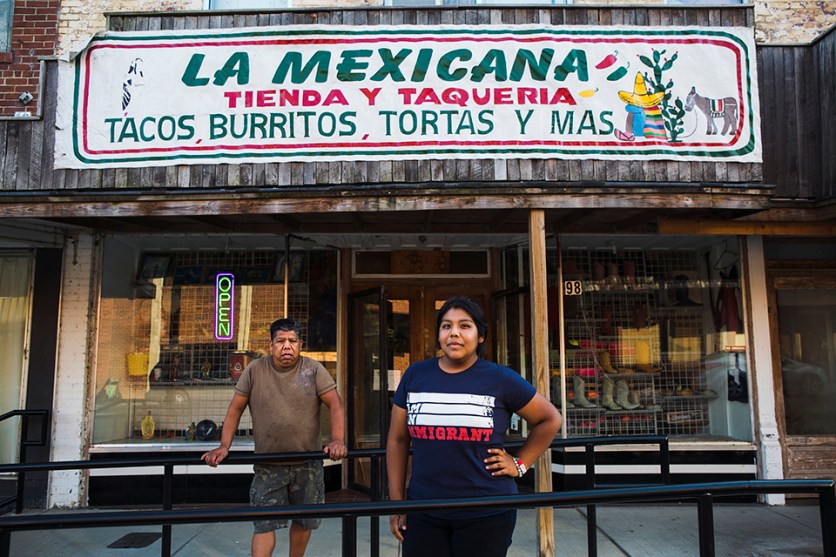
José Tomas, 55, and his daughter, Guadalupe Tomas, 18, outside Jose’s restaurant.
Yalonda M. James
Romero, who has a round face, kind eyes, and spiky black hair, emigrated from El Salvador with his parents when he was seven years old. He’s the father of three children, ranging in age from 8 to 19, and he works as a manager for Williams Sonoma in Memphis, an hour and a half away. Trump reminds him of Fidel Castro, the way his mind changes from day to day, the coarse language he uses.
One day, his daughter came home from school, frightened because the other kids were telling her that Trump was going to send all the Hispanics out of the country. He asked her how she responded. “I didn’t say nothing because I didn’t want to get mad,” she replied.
Romero told her that was the best thing she could have done. He tries to alleviate his children’s fears by praying with them and urging them to maintain trust in God, but he grapples with uncertainty too. He’s hearing more stories from parents whose children relay what they hear in the schoolyard: “You don’t belong here.”
In spite of Trump’s speeches about “the wall” and escalating border arrests, Romero says families will continue trying to cross, largely out of desperation for a better life.
Romero is saving up to become a citizen—right now, he’s only a permanent resident. And in the meantime, he and some of the members of his congregations have been attending anti-Trump, pro-immigrant marches in Memphis.
“One way or another, we’re gonna be over here,” he says. “There are always going to be ways. You know how many millions of people have died on that border on their way here? It’s a risk of life, but they take it because the mentality is that this is the future—right here.”
Elena Garcia: “Some of them I even thought were my friends at one point.”
My former classmate Elena Garcia—whose name I’ve also changed here to protect her privacy—is diminutive and quiet, with a sweet smile and a friendly demeanor. Her dark, wavy hair falls nearly to her waist.
Garcia is a 26-year-old quality-control worker at Pictsweet Farms, a factory that produces frozen vegetables, where she makes $11.30 per hour, working five or six 10.5-hour shifts a week. It’s the largest employer in Bells. She’s saving up to go to college, perhaps to pursue nursing.
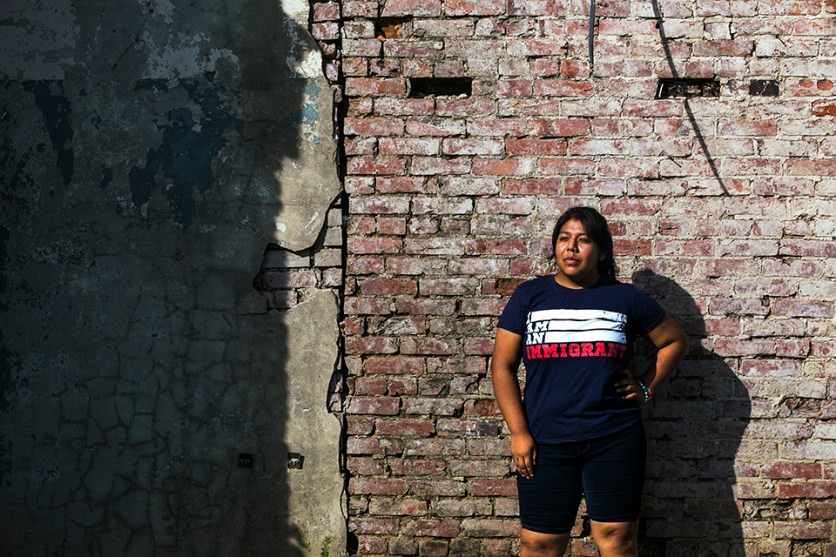
Guadalupe Tomas
Yalonda M. James
Garcia, who was born in Mexico, is a beneficiary of an Obama-era policy called Deferred Action for Childhood Arrivals that granted a renewable two-year work permit to young undocumented immigrants who entered the country before their 16th birthday and before June 2007. DACA was supposed to provide protection from deportation, but that’s changing: In February, the first DACA recipient was deported under Trump. GOP leadership in 10 states, including Tennessee, sent a letter in June to Attorney General Jeff Sessions calling for the end of DACA.
Garcia’s parents are undocumented, and she wrestles with the fear they will be deported. If that were to happen, Garcia could not travel to see them—DACA does not allow for travel outside the United States. She’s not eligible for a passport.
“We haven’t been [to Mexico] in years and I don’t know what my parents would do there with people they don’t know anymore,” she said. “Me being such an attached person to my family, girl, I would cry rivers.”
If her parents were sent back to Mexico, she is afraid they wouldn’t survive. For years, she tells me she’s heard stories of cartel violence that has killed people she knew as a child, and of others who were kidnapped or have simply disappeared.
Undocumented immigrants make up about 2 percent of Tennessee’s population, according to a report by the Pew Research Center-Hispanic Trends. From 2000 to 2014, the Hispanic population in Tennessee rose 175 percent. (Overall population in the state only rose 15 percent.) Tennessee has the second-fastest growing Hispanic population in the nation.
When Trump began to gain popularity, Garcia felt betrayed by people she thought she knew, people we both grew up with. Late last year, Garcia began to see a pattern on her Facebook feed. One post said, “I can’t wait for Trump to take over, so we can start building this wall.” A commenter added, “Yeah, and the Mexicans are going to pay for it and work for it.”
She stared at her screen in disbelief. “Some of them I even thought were my friends at one point.”
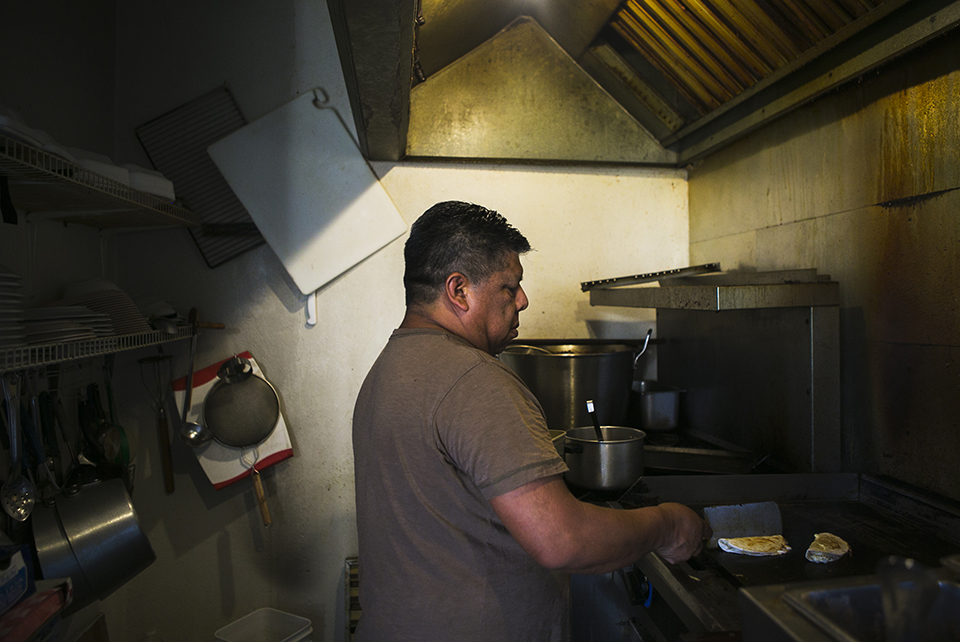
José Tomas cooks in his restaurant.
Yalonda M. James
Before Trump started to gain traction in the rural Southeast, she didn’t see or hear comments like that. Before, she says, the racism “was in the darkness, the shadows.” She felt like she was part of the community, and she earned her place here.
The day after the election, I was scrolling through my own Facebook feed when an uncharacteristically emphatic post from Garcia caught my eye. “It’s sad to believe what this new president is causing…I’m seeing on my news feed all these racist posts, comments such as ‘build that wall’ ‘get our jobs back’…only spreading hatred, supporting racism,” she wrote. “All I will do is delete those spreading negativity and continue praying for all of us. GOD BLESS US!”
The comments started rolling in, mostly from former classmates. The first was from a white man who argued that racism and illegal immigration are separate issues. A Hispanic woman joked that now non-Hispanic people will have to do the jobs like “washing cum-soaked comforters at the hotel,” because immigrants would all be deported now. A white woman retorted that white people already do those jobs—they just work their way up out of them.
In the months since she wrote that Facebook post, Garcia has mostly avoided confrontation. Instead, she relies on her faith to diminish fear and doubt. “Us Christians, we know who to put our trust in,” she says firmly.
The Reverend James Perry: “We got another king in Egypt now, but we’re on God’s side.”
On a Sunday morning in Crockett County, there’s really only one thing to do: go to church. There are tiny houses of worship tucked away just off of most main roads in the county, but Antioch Missionary Baptist Church is smaller than most, and smaller than Romero’s church, with a limited but vibrant congregation. Pink carpet lies beneath creaky old wooden pews topped with well-worn maroon cushions.
It is a black church, and I am very white, with pick-me-out-of-any-crowd red hair, but it doesn’t matter—the women hug me and kiss my cheeks just like the women in the white church I had grown up in. The men greet me with large smiles and hearty handshakes.
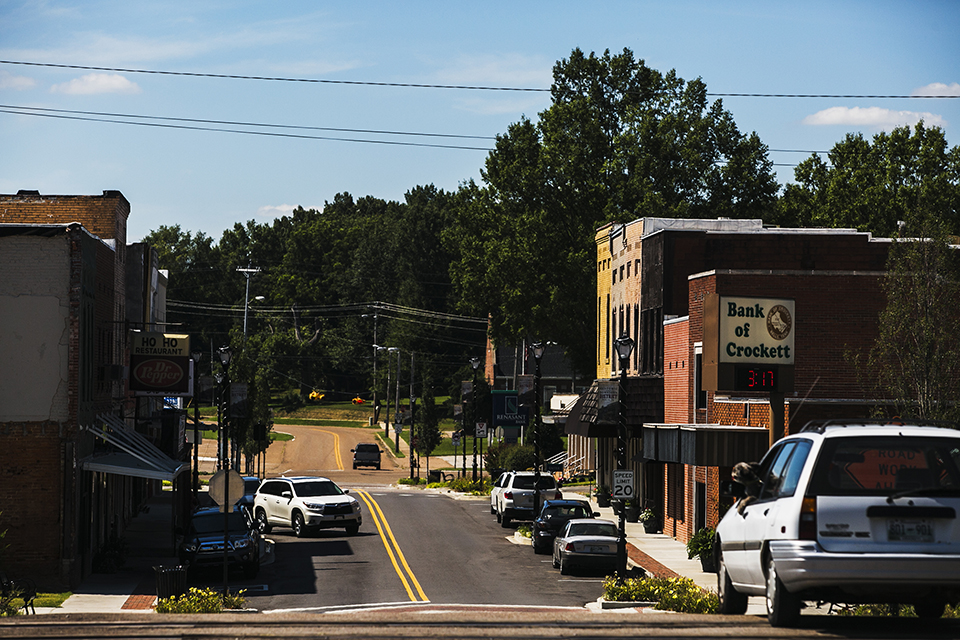
Downtown Bells
Yalonda M. James
The Reverend James Perry stands straight-backed in the pulpit, vases filled with white and yellow flowers on either side of him. He wears a smart gray suit with shiny black shoes and black rimmed glasses. As he preaches, he paces back and forth and gestures energetically, occasionally pausing to wipe sweat from his forehead.
“We shouldn’t be worrying about what Trump’s gonna do,” he tells his congregation, “because God holds a king’s heart in his hands.”
Perry speaks with sincerity and conviction—he doesn’t strike me as a liar, and if somehow he is one, he is pathologically good. Listening to the sermon, I’m convinced that he believes every word.
“Barack Obama done great things for us,” he says. “We got another king in Egypt now, but we’re on God’s side.”
He tells the story of how Moses led the Israelites out of Egypt, and emphasizes the pain and suffering the people of Israel endured before they were delivered. “We’ve gotta stay on God’s side, because we don’t know, Trump might be the one to usher us outta here,” Perry declares. “Whatever Trump does, raise up your confession, because we can hold fast to what God has said—he will deliver us.”
He assures his congregation that even if the path won’t be easy, the end of the journey will be worth it—I take this to be a metaphor for heaven. “How long were we in slavery? Then God came and delivered us. He will do it again.”
Shouts of “amen!” come from behind me. As the service ends the congregation claps their hands and sways in time to the music. “No-body but Je-suuuus is keepin’ me alive…”
When I followed up with Perry and some members of his congregation, they did not want to talk further about politics. Their stance is simple—at the end of the day, they have nothing to fear, because they trust their God. There is nothing more to say.
Guadalupe Tomas: “We have to be proud that we’re Mexicans, and we’re proud that we’re here.”
I meet Guadalupe Tomas in her father’s restaurant, amid the pungent fragrance of food that her father, José, assured my parents a couple of weeks prior would be too spicy for their palates. (He was right.)
Guadalupe is just 18, but she speaks with more self-assuredness than most adults I know. “We have to show that Mexicans are not just stupid people that go to school and then we slack around and all that stuff,” she tells me. “We have to be proud that we’re Mexicans and we’re proud that we’re here—we have to show them that working is a priority for Mexicans.”
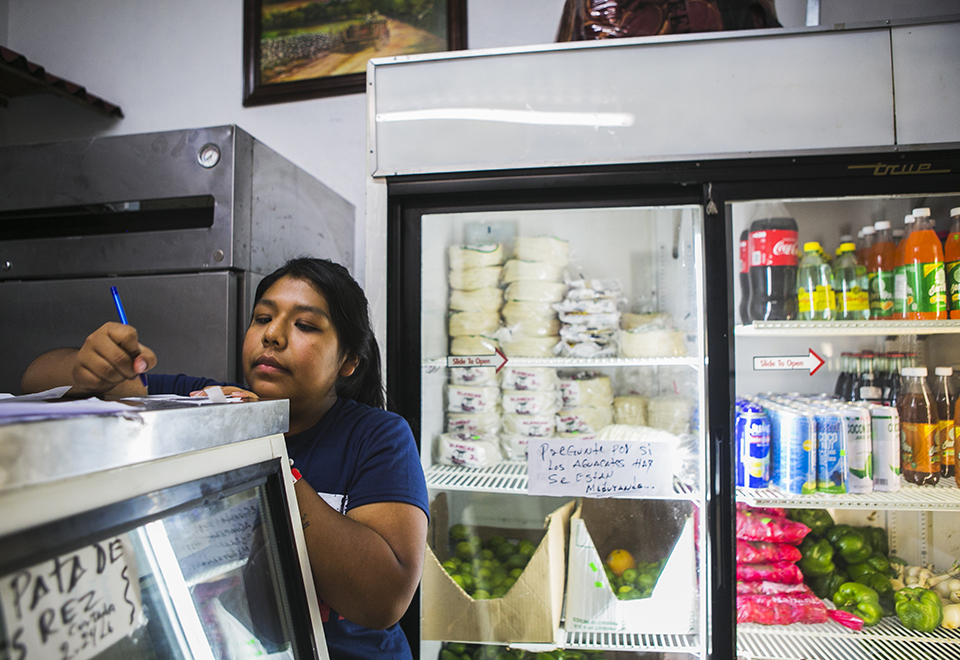
Guadalupe Tomas works in her father’s restaurant.
Yalonda M. James
When she’s not taking classes toward a business management degree at Jackson State Community College, Guadalupe works the register at the front of the store, one watchful eye on customers, another on her younger brothers.
When Trump was elected, Guadalupe was not surprised. During her senior year in high school, Trump won a mock primary the school held by a landslide. Some of her white classmates said they voted for him because they wanted the Mexican people in the country to be deported.
Unlike Garcia’s family, Guadalupe’s family has been in America for generations. Her great-grandfather immigrated to Tennessee and found work putting down railroad tracks. The family followed him: first, Guadalupe’s grandfather, then José.
When José came to America, he worked on a farm with his father, picking strawberries and squash. They lived on the farm—José, his parents, and his brothers—and were told by their employers that they were not allowed to go into town, and they were specifically not allowed to speak to anyone outside the farm who was not Hispanic. During the off-seasons, they migrated back to Mexico, but when the drug wars escalated in Michoacán, they stayed in the States for good, opening several taquerias like this one.
The businesses have been successful, but now, Guadalupe tells me they are seeing less frequent visits from the Hispanic customer base. People are afraid to leave their homes, just as they are in Romero’s congregation. Her brother told her he saw an ICE truck out in the county recently as he was returning home from work at night.
Guadalupe and her siblings are the first in the Tomas family to be able to attend school. José says his father’s generation and then his generation of the family were never allowed to leave their agricultural work to get an education. Their story is about as “American Dream” as it gets, but for some folks, American only equals “white.” And changing their minds, even while living among them, is a tall order.
“I asked my friend—she’s white—I said, ‘Who did you vote for?’ and she answered, ‘Trump,'” Guadalupe remembered. “Then, I start to turn around and she says something about Mexicans.”
She pauses briefly, frowning. “I’m not going to feel bad about my color, about my race. I like my color.”
When I ask her about her plans for the future, Guadalupe grins, even as it seems her friend and all her Trump-supporting neighbors come to mind. She tells me she wants to own her own company someday, to show everyone “what a strong Mexican woman can do.”
